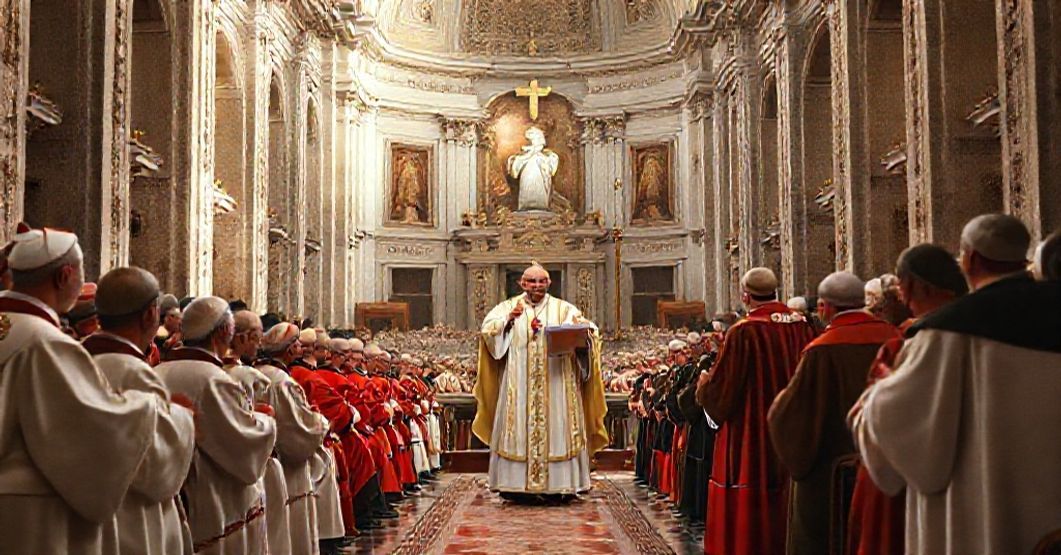Antipopes of the Antichurch



















Timeline of this heretical pontiff
Encyclical Letters
+ 15 posts1959
+ 7 posts1961
+ 4 posts1962
+ 2 posts1963
+ 2 postsApostolic Exhortations
+ 3 postsApostolic Constitutions
+ 93 posts1958
+ 6 posts1959
+ 87 postsMotu Proprio
+ 15 posts1958
+ 1 posts1959
+ 1 posts1962
+ 11 postsApostolic Letters
+ 151 posts1958
+ 4 posts1959
+ 63 posts1960
+ 78 posts1961
+ 1 posts1962
+ 4 posts1963
+ 1 postsSpeeches
+ 99 posts1958
+ 2 posts1959
+ 26 posts1960
+ 29 posts1961
+ 16 posts1962
+ 24 postsMessages
+ 6 posts1959
+ 4 postsHomilies
+ 4 postsLetters
+ 152 posts1958
+ 1 posts1959
+ 48 posts1960
+ 32 posts1961
+ 31 posts1962
+ 30 posts1963
+ 10 postsNot categorized
+ 1 posts1958
+ 1 postsNews feed


Allocutio Ioannis XXIII (1960.03.28): Cardinalatial Engineering for the Conciliar Revolution
On 28 March 1960, in the Apostolic Palace, John XXIII delivered a secret consistorial allocution announcing the creation and publication of new members of the College of Cardinals, praising the Roman Curia, lamenting persecutions (notably recalling Aloysius Stepinac), exalting the recently concluded Roman Synod, and explicitly linking this new wave of cardinals from various continents with the preparation of the Second Vatican Council and the universal mission of the Church. He presents this expansion as a sign of unity, catholicity, and peace, and as an answer to contemporary social and political crises, concluding with the formal creation of several cardinals (including Traglia, Doi, Lefebvre, Alfrink, Santos, Rugambwa, Bacci) and three in pectore.


Ioannes XXIII – Romanae Dioecesis Prima Synodus (1960.01.31)
Laudatory address of John XXIII on the closing of the 1960 Roman Diocesan Synod in St Peter’s Basilica, exalting the Synod’s decrees as a “superabundant gift of God,” glorifying the Roman diocesan clergy and laity as proof of the vitality of the post-war Church, presenting the Synod’s eight thematic areas as a model of pastoral renewal, linking this local synod directly to the projected convocation of the Second Vatican Council, and proposing a program of “firm faith, invincible hope, and effusive charity” crowned by popular devotions (Name, Heart and Precious Blood of Christ) and Marian piety, in view of a universal aggiornamento.


Sacrae Laudis (1962.01.06): Liturgical Piety Enlisted for Conciliar Revolution
Vatican portal presents the Latin text of the apostolic exhortation “Sacrae Laudis” of antipope John XXIII (January 6, 1962), which solemnly calls the entire clergy “in peace and communion with the Apostolic See” to recite the Divine Office with greater fervour for the “happy outcome” of the Second Vatican Council. John XXIII frames Vatican II as a “new Epiphany” and “new Pentecost,” exhorts priests to unite daily prayers and the Most Holy Sacrifice with this intention, links the Breviary with the marks of the Church (*una, sancta, catholica, apostolica*), and presents the Council as an organic flowering of Tradition aimed at adapting ecclesiastical discipline to “the needs of this age” and attracting separated communities back to unity. In reality this document is a programmatic attempt to conscript authentic Catholic devotion, liturgy, and hierarchical obedience into serving the conciliar subversion of the Church.


Paenitentiam agere (1962.07.01)
The cited document is the Latin text of the encyclical Paenitentiam agere of John XXIII (1 July 1962), issued on the eve of the Second Vatican Council. It exhorts the hierarchy and faithful to prayer, interior and exterior penance, sacramental confession, voluntary mortification, and novenas to the Holy Ghost, so that the upcoming Council may bear “salutary fruits,” strengthen faith and morals, promote unity, and contribute to the expansion and confirmation of the “Kingdom of God.” It amasses biblical references, recalls patristic and Tridentine doctrine on penance, and insists that the whole Church prepare spiritually for the Council. Yet precisely by placing authentic notions of penance at the service of the conciliar project, it instrumentalizes supernatural truths to legitimize an impending revolution, thereby perverting penitential language into a pious varnish for apostasy.
Varia
Announcement:
– News feed –implemented
– Antipopes separate web sites with their all documents refutation – in progress
